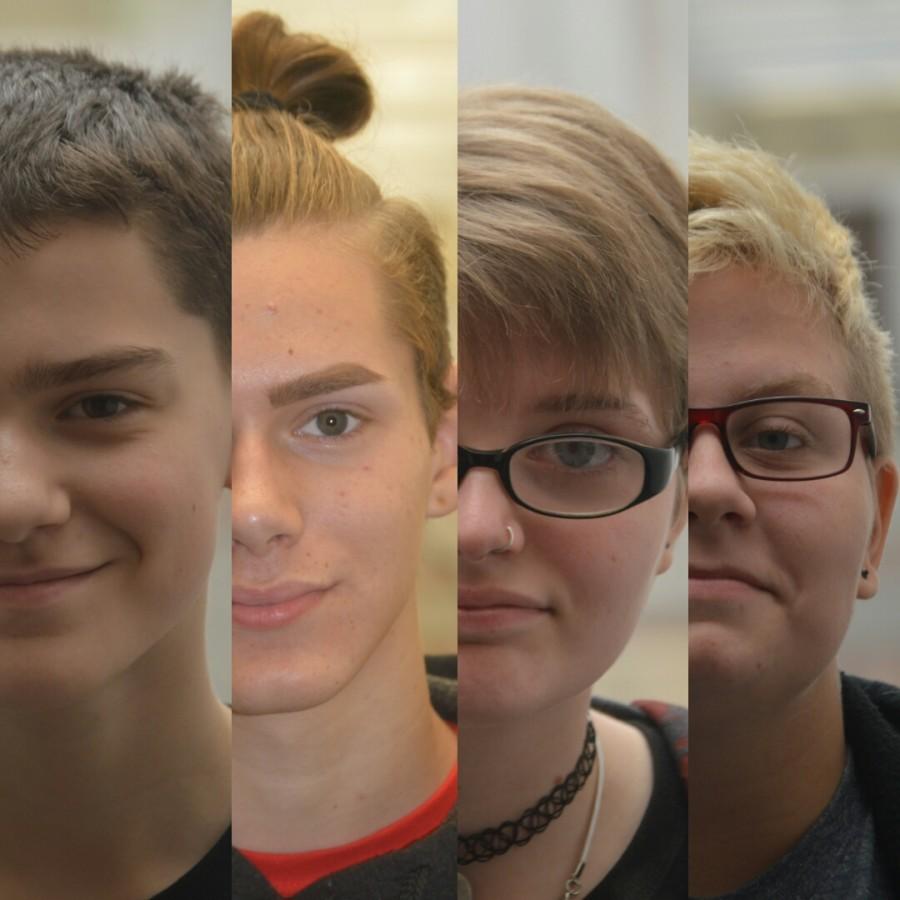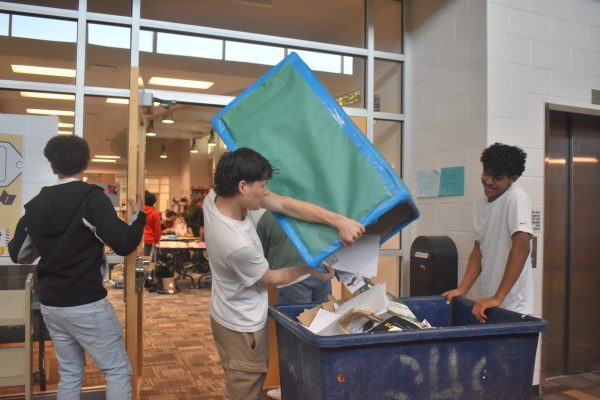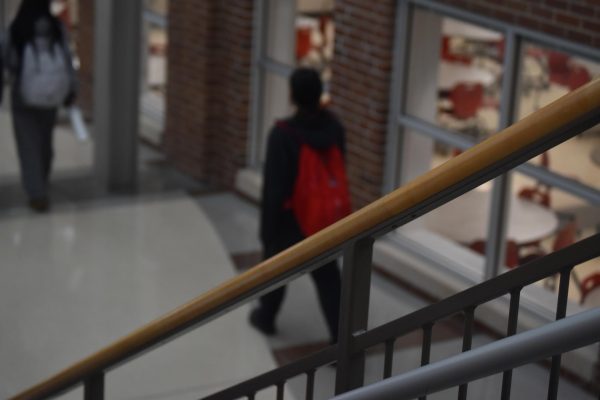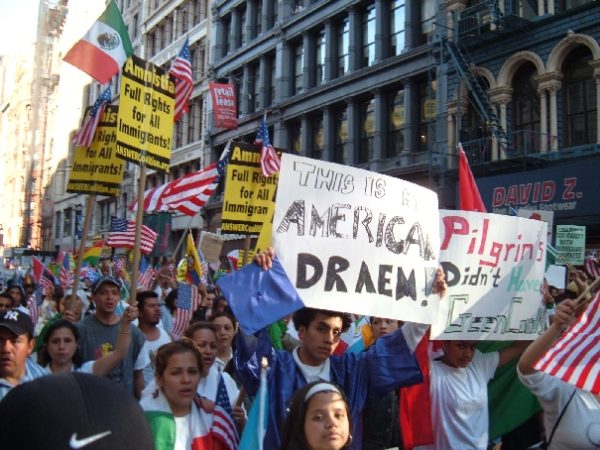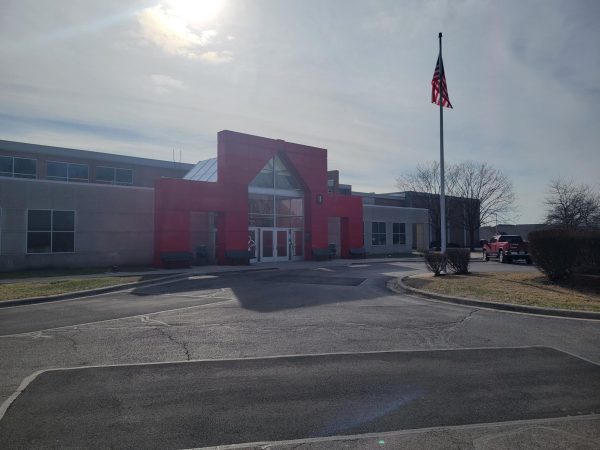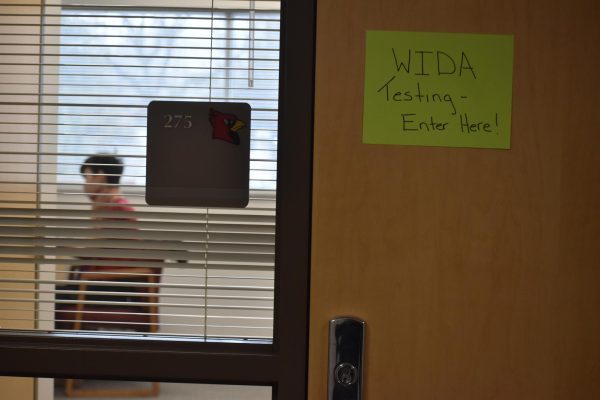Facing reality: acceptance rising
(L to R) Freshman Thomas Jones, senior Nick May, sophomore Ashley Newland and junior Emma Cooper. These students come together to contribute their opinions of gay acceptance at SHS.
When senior Nick May first entered SHS as a freshman, he walked into a new building full of unfamiliar faces, not knowing if they would accept him because of the sexuality with which he identified. When he entered this year, he could rest assured that he could love whomever he wanted without the fear of receiving hate for who he is.
That assurance comes largely because the Supreme Court legalized same-sex marriage on June 26 in all 50 states in a 5-4 decision.
The assurance is also due to the nation’s changing perspective. When May was a freshman, the amount of people in the US who approved of same-sex marriage was 48 percent, according to the PEW Research Center. In the last three years, it has grown to 55 percent.
“Things have gotten so much better over the years for LGBT people, but the fight is not over,” May said.
Acceptance of members of the LGBT community has grown over the past few years. Many members of the community who attend SHS feel that it has grown in their tenure at the school. However, not everyone in the world is as accepting as others.
According to a poll of 151 students done in selected iPass classes on Aug. 21 at SHS, 53.6 percent of the respondents approve of gay marriage. Of those polled, 21.2 percent disapprove, and 25.2 percent report that they didn’t care.
Approval could have been swayed some by what the Pride Alliance Club has done. Last year, the club did a “Don’t say gay in a negative way” campaign. The campaign was filled with everything from videos on the announcements to a banner for the student body to sign and pledge to not call things gay in a derogatory sense.
The Pride Alliance Club has been a safe place for students who identify with the LGBT community to come, hang out and share what’s going on.
“You’ve got to have that bridge between all sides of the community,” junior Emma Cooper said. “Even within the community itself, there is a lot of discrimination and judgement especially on bisexual people (and) transgender people. I feel like the Pride Alliance is a really good way to bridge that gap between those two areas and straight allies. It is a good place for people to come together and discuss the issues within the community.”
Some believe that it was easier for freshmen who are gay to come into high school in July.
“It (acceptance growing) made it a lot easier,” freshman Thomas Jones said. “It’s just a lot easier to come out to people.”
But not all feel as May and Jones did. Sophomore Ashley Newland is one that wasn’t as comfortable coming out while in high school.
“I thought I wasn’t really going to be accepted,” Newland said, “but then I found out some of my friends were gay. Then I started feeling a little bit comfortable.”
Mr. Brent Bockelman said that when he was here just 15 years ago as a student, no one really talked about it. He went on to say that even when he first was hired in 2005, it still was not a prevalent issue.
“I see more and more people talking about it, people not being afraid to say things,” Bockelman said.
However, not everyone is very accepting and willing to talk about it around the world.
The first country to legalize same-sex marriage was the Netherlands in 2000, and the US was the last, so far, in June. A total of just 22 countries out of 195 in the world have legalized same-sex marriage.
In many places, such as Saudi Arabia, it is even illegal to be gay, punishable by jailing or death. Around the world, 69 percent of countries have laws such as these.
Even some of the allies of the U.S. are not very accepting.
On July 30, in Jerusalem, Israel, Yishai Schissel, an ultra-orthodox Jew, stabbed six people at a gay pride parade. One of the victims, 16 year old Shira Banki, succumbed to her wounds on Aug. 2nd and passed away in a hospital.
However, this attack did not scare people away. Noam Eyel, a man who got stabbed during the parade, told the Jerusalem Post he would be returning next year for the annual event.
Even here at home, members of the community feel some discrimination.
On March 26, Indiana Governor Mike Pence signed the Religious Freedom Restoration Act, or RFRA, in an effort to protect the religious freedoms of citizens in Indiana, which many people state and nation wide felt legalized discrimination against members of the LGBT community.
Pence received a lot of criticism for signing the act. However, many people felt the media twisted Pence’s words.
“He said it wrong,” junior Steven Moore said, “I read it and the reason people were getting (upset) about that was because they didn’t read it through.”
On April 2, just a week later, Pence worked with the state assembly to pass a “fix” to the bill clarifying that the bill did not affect the LGBT community.
“We won the battle, the war is not yet over.” Cooper said.
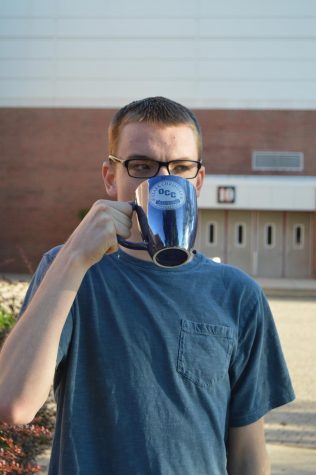
Hello. My name is Andrew Tapp and I have the distinct honor and pleasure of being the Editor-in-Chief of The Journal for this school year. As...


